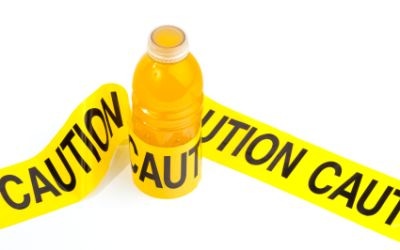Energy Drinks and Ephedra: Déjà Vu All Over Again?

On Nov. 23, 2004, Health and Human Services Secretary Tommy Thompson announced FDA finalized a regulation barring the sale of ephedrine-containing dietary supplements based on a determination that such products posed an unreasonable risk" to human health. The promulgation of that regulation culminated a decade-long effort by state and federal regulators, including a much-derided proposed federal regulation issued in 1997, to curb the sale of ephedra in response to numerous reports of adverse events allegedly associated with the use of this herb.
Despite significant questions regarding the legal and scientific bases for FDAs decision to remove ephedra from the market, ultimately the combination of political/media scrutiny focused on these products created an atmosphere where any serious defense of the category became impossible. Driven largely by extreme marketing claims from various classes of producers suggesting ephedra was either a miracle weight-loss ingredient or a substitute for illegal amphetamines, politicians, lead by Sen. Richard Durbin (D-IL), and regulators were able to successfully portray ephedra marketers as irresponsible peddlers of stimulants (ephedra was popular because it workedephedrine alkaloids are really stimulants) motivated only by sales with no regard for consumer/public health.
The scrutiny currently focused on the energy drink market is uncomfortably reminiscent of the scrutiny placed on ephedra a decade ago.
Negative Media
During the past six months, energy drinks have been the subject of intense media scrutiny. Stories appearing in the mainstream press have focused on subjects such as aggressive marketing to college students cramming for exams (Washington Post: Energy drink popularity booms at college despite health concerns"); other risky marketing practices (Forbes: "Can Energy Drinks Kill? The FDA Investigates, Consumers Worry, A Business Under Fire"); mislabeling and unsubstantiated claims (The New York Times: Energy Drinks Promise Edge But Proof is Scant" and Chicago Tribune: Amount of caffeine in diet supplements all over the map: study" ); and potentially serious health risks (The New York Times: Energy Drink Disclosures Expose Gaps in Safety Policy").
Even more alarming are the stories suggesting a link between the consumption of energy drinks and serious adverse events, including death. In particular, media attention has focused on claims by the family of 14-year-old Anais Fournier, who died of a heart arrhythmia allegedly after consuming cans of a popular energy drink on consecutive days. Stories about the death and the subsequent product's liability litigation appeared in The New York Times, USA Today, Wall Street Journal and numerous other media outlets. The vast majority of these stories focused on concerns regarding caffeine levels in energy drinks, the presence of other stimulant ingredients, (mistaken) claims that FDA could not regulate these products because they are dietary supplements while glossing over the fact that Fournier had a pre-existing cardiac condition (The New York Times: "Monster Energy Drink Cited in Deaths"). Media attention has also been focused on the potential risks associated with marketing encouraging the use of energy drinks in combination with alcoholeither to allow the consumption of more alcohol or to negate its intoxicating effects (Seattle Times: Alcohol poisoning killed student; aunt says energy drinks had role").
Similar stories abounded in the months (even years) leading up to the FDAs ban on ephedra (including risky marketing comparing the effects of ephedra-containing dietary supplements to amphetamines) and helped fuel an atmosphere that virtually guaranteed that when FDA finally acted, industry would be unable to mount any kind of serious challenge.
Bad Politics
Seizing on this media coverage, Sen. Durbin, a longtime critic of the dietary supplement industry and the FDA, publicly called out energy product marketers and the agency for allegedly putting the public's health at risk. Joined by Sen. Richard Blumenthal (D-CT), Sen. Durbin sent three letters to FDA Commissioner Margaret Hamburg, MD, requesting the agency to take action to regulate the sale of energy drinks. Each of these letters cited an apparently rising number of adverse events associated with the consumption of these productsdespite a dearth of evidence suggesting causation. This letter-writing campaign culminated in a Dec. 6, 2012, meeting between the senators and the FDA commissioner. According to a press release posted on Sen. Blumenthal's website, Dr. Hamburg made it clear it is moving forward in a number of areas to protect vulnerable populations against high levels of caffeine in energy drinks. The energy drink makers are mistaken if they believe they have escaped regulatory oversight to safeguard consumer health."
On the other side of Capitol Hill, Rep. Edward Markey (D-MA), called on FTC to investigate claims made by energy drink marketers that appear to encourage use of the products by children. Rep. Markey, a member of the House Committee on Energy and Commerce, which oversees FTC, specifically cited, The advertising claims made by energy drink manufacturers are particularly alarming in light of the increase in advertisements targeted primarily to children and teenagers." In addition, New York State Attorney General Eric Schneiderman launched an investigation into potentially misleading claims by energy drink marketers by issuing subpoenas to Monster Beverage, Pepsi Co. and Living Essentials. Facts May Not Matter
Despite the dearth of evidence showing causation between any adverse event and use of energy drinks, pressure continues to mount on the category in a manner uncomfortably similar to events prior to the ultimate banning of ephedra. Among other things, there have been calls for regulatory action requiring mandatory disclosure of the amount of caffeine in energy drinks; restrictions on combining caffeine with other stimulant" ingredients; municipalities such as Nassau and Suffolk Counties in New York, Chicago and Miami considering restricting the sale of these products to minors; and Canada recently promulgated regulations limiting the amount of caffeine in single-serving containers to 180 mg, while larger containers are limited to 400 mg per liter. It is expected that between 25 and 30 marketers will be required to reformulate if they wish to stay on the market.
On Feb. 17, 2004, Stephen Bechler, a pitching prospect for the Baltimore Orioles succumbed to heat stroke while at training camp. Media stories immediately associated his use of ephedra-containing dietary supplements with his death. Lost in the media hyperbole were the facts that Bechler had reported to camp overweight, was told that he had a limited amount of time to lose this weight, that he was on a diet that severely restricted his food and liquid intake and that he was wearing a rubber sweat suit while working out in the Florida sun when he suffered the heat stroke. After these events, ephedras fate was all but sealed.
As long as media and Congressional attention remains focused on energy drinks as a category, the threat of serious legislative/regulatory action is real. Just like with the penultimate act in the ephedra saga, the facts may not matter.
Marc Ullman is a partner at the New York-based law firm Ullman, Shapiro & Ullman LLC.
Learn more about the recent history of the energy drink controversy in INSIDER's 2012 Year in Review Digital Issue.
About the Author(s)
You May Also Like






.png?width=800&auto=webp&quality=80&disable=upscale)